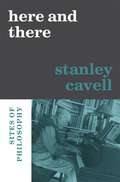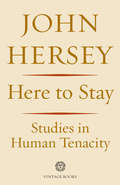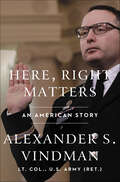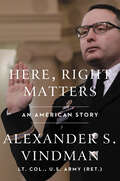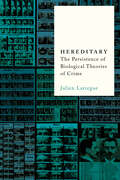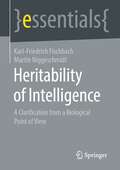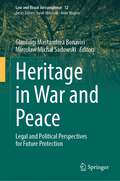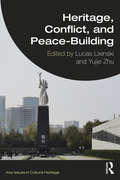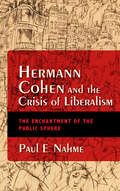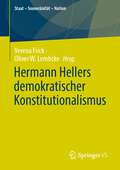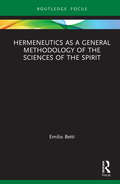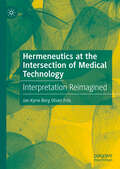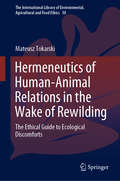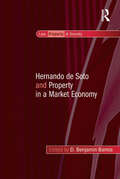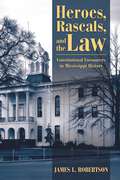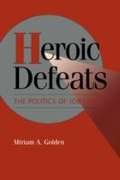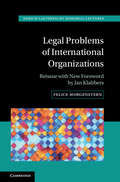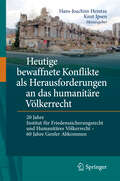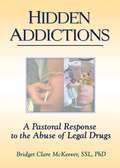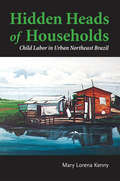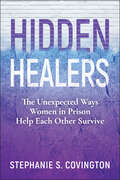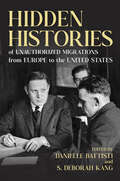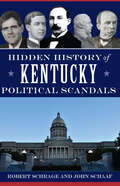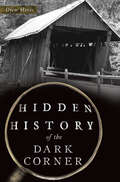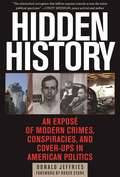- Table View
- List View
Here and There: Sites of Philosophy
by Stanley CavellThe first posthumous collection from the writings of Stanley Cavell, shedding new light on the distinctive vision and intellectual trajectory of an influential American philosopher. For Stanley Cavell, philosophy was a matter of responding to the voices of others. Throughout his career, he articulated the belief that words spring to life in concrete circumstances of speech: the significance and power of language depend on the occasions that elicit it. When Cavell died in 2018, he left behind some of his own most powerful language—a plan for a book collecting numerous unpublished essays and lectures, as well as papers printed in niche journals. Here and There presents this manuscript, with thematically relevant additions, for the first time. These writings, composed between the 1980s and the 2000s, reflect Cavell’s expansive interests and distinctive philosophical method. The collection traverses all the major themes of his immense body of work: modernity, psychoanalysis, the human voice, moral perfectionism, tragedy, skepticism. Cavell’s rich and cohesive philosophical vision unites his wide-ranging engagement with poets, critics, psychoanalysts, social scientists, and fellow philosophers. In Here and There, readers will find dialogues with Shakespeare, Thoreau, Wittgenstein, Freud, Heidegger, Walter Benjamin, Wallace Stevens, Veena Das, and Peter Kivy, among others. One of the collection’s most striking features is an ensemble of five pieces on music, constituting Cavell’s first discussion of the subject since the mid-1960s. Edited by philosophers who have been invested in Cavell’s work for decades, Here and There not only gathers the strands of a writing life but also maps its author’s intellectual journeys. In these works, Cavell models what it looks like to examine seriously one’s own passions and to forge new communities through unexpected conversations.
Here to Stay (Tesoro Bks.)
by John HerseyIn Here to StayJohn Hersey tells of episodes in the past twenty years in which Man has courageously risen above desperate situations and shown his determination to survive despite the threats of the nuclear age. Mr. Hersey first tells the story of an old lady marooned on a rooftop amidst floods caused by a hurricane. He ends with his famous Hiroshima, the story of the survivors of the first atomic bombing, written from personal investigation, with horrifying detail and compassionate indignation. Between these two pieces we read of John Kennedy’s heroism in rescuing the crew of his PT boat, sunk by the Japanese, seventeen years before he became President; a Jew’s suffering in Auschwitz; a crippled G.I.’s difficulties in adjusting himself to civilian life; the rehabilitation of a soldier paralyzed with fright; the adventures of two Poles who survived persecution; and a most moving account of an escape from Hungary in 1956. All John Hersey’s books have had a serious purpose. A Bell for Adanodrew attention to Italy’s plight; The Wall studied the Polish Jews’ struggle against tyranny; The War Lover exposed the war mentality;The Child Buyershowed up the exploitation of talent. Here to Stayis a stirring reminder of our inherent ability to meet the challenge of extinction which now faces the world.
Here, Right Matters: An American Story
by Alexander VindmanRetired U.S. Army Lieutenant Colonel Alexander Vindman, who found himself at the center of a firestorm for his decision to report the infamous phone call that led to presidential impeachment, tells his own story for the first time. Here, Right Matters is a stirring account of Vindman's childhood as an immigrant growing up in New York City, his career in service of his new home on the battlefield and at the White House, and the decisions leading up to, and fallout surrounding, his exposure of President Trump's abuse of power. 0900, Thursday, July 25, 2019: President Trump called Ukraine’s President Zelensky, supposedly to congratulate him on his recent victory. In the months that followed, the American public would only learn what happened on that call because Alexander Vindman felt duty-bound to report it up the chain of command: that the President of the United States had extorted a foreign ally to damage a political challenger at home. Vindman’s actions and subsequent testimony before congress would lead to Trump’s impeachment and affirm Vindman's belief that he had done the right thing in the face of intense pressure to stay silent. But it would come at an enormous cost, straining relationships with colleagues, superiors, and even his own father, and eventually end his decorated career in the US Army, by a Trump administration intent on retribution. Here, Right Matters is Vindman’s proud, passionate, and candid account of his family, his career, and the moment of truth he faced for his nation. As an immigrant, raised by a father who fled the Soviet Union in pursuit of a better life for his children, Vindman learned about respect for truth throughout his education and military service. As this memoir makes clear, his decision to speak up about the July 25th call was never a choice: it was Vindman’s duty, as a naturalized citizen and member of the armed forces. In the wake of his testimony, he would endure furious partisan attacks on his record and his loyalty. But far louder was the extraordinary chorus of support from citizens who were collectively intent on reaffirming an abiding American commitment to integrity. In the face of a sure-fire career derailment and public excoriation, Vindman heeded the lessons from the people and institutions who instilled in him the moral compass and the courage to act decisively. Like so many other American immigrant families, the Vindmans had to learn to build a life from scratch and take big risks to achieve important goals. Here, Right Matters is about the quiet heroes who keep us safe; but, above all, it is a call to arms for those who refuse to let America betray its true self.
Here, Right Matters: An American Story
by Alexander VindmanRetired U.S. Army Lieutenant Colonel Alexander Vindman, who found himself at the center of a firestorm for his decision to report the infamous phone call that led to presidential impeachment, tells his own story for the first time. Here, Right Matters is a stirring account of Vindman's childhood as an immigrant growing up in New York City, his career in service of his new home on the battlefield and at the White House, and the decisions leading up to, and fallout surrounding, his exposure of President Trump's abuse of power. 0900, Thursday, July 25, 2019: President Trump called Ukraine’s President Zelensky, supposedly to congratulate him on his recent victory. In the months that followed, the American public would only learn what happened on that call because Alexander Vindman felt duty-bound to report it up the chain of command: that the President of the United States had extorted a foreign ally to damage a political challenger at home. Vindman’s actions and subsequent testimony before congress would lead to Trump’s impeachment and affirm Vindman's belief that he had done the right thing in the face of intense pressure to stay silent. But it would come at an enormous cost, straining relationships with colleagues, superiors, and even his own father, and eventually end his decorated career in the US Army, by a Trump administration intent on retribution. Here, Right Matters is Vindman’s proud, passionate, and candid account of his family, his career, and the moment of truth he faced for his nation. As an immigrant, raised by a father who fled the Soviet Union in pursuit of a better life for his children, Vindman learned about respect for truth throughout his education and military service. As this memoir makes clear, his decision to speak up about the July 25th call was never a choice: it was Vindman’s duty, as a naturalized citizen and member of the armed forces. In the wake of his testimony, he would endure furious partisan attacks on his record and his loyalty. But far louder was the extraordinary chorus of support from citizens who were collectively intent on reaffirming an abiding American commitment to integrity. In the face of a sure-fire career derailment and public excoriation, Vindman heeded the lessons from the people and institutions who instilled in him the moral compass and the courage to act decisively. Like so many other American immigrant families, the Vindmans had to learn to build a life from scratch and take big risks to achieve important goals. Here, Right Matters is about the quiet heroes who keep us safe; but, above all, it is a call to arms for those who refuse to let America betray its true self.
Hereditary: The Persistence of Biological Theories of Crime
by Julien LarregueSince the 1990s, a growing number of criminal courts around the world have been using expert assessments based on behavioral genetics and neuroscience to evaluate the responsibility and dangerousness of offenders. Despite this rapid circulation, however, we still know very little about the scientific knowledge underlying these expert evaluations. Hereditary traces the historical development of biosocial criminology in the United States from the 1960s to the present, showing how the fate of this movement is intimately linked to that of the field of criminology as a whole. In claiming to identify the biological and environmental causes of so-called "antisocial" behaviors, biosocial criminologists are redefining the boundary between the normal and the pathological. Julien Larregue examines what is at stake in the development of biosocial criminology. Beyond the origins of delinquency, Larregue addresses the reconfiguration of expertise in contemporary societies, and in particular the territorial struggles between the medical and legal professions. For if the causes of crime are both biological and social, its treatment may call for medical as well as legal solutions.
Heritability of Intelligence: A Clarification From a Biological Point of View (essentials)
by Karl-Friedrich Fischbach Martin NiggeschmidtIs intelligence heritable? Karl-Friedrich Fischbach and Martin Niggeschmidt show that "heritability" means something different in biological terminology than in everyday language - which almost inevitably leads to misinterpretations. They explain why twin studies are controversial - and why genetic predictions of IQ and "educational attainment" must be treated with skepticism. This book is a translation of the original German 2nd edition Erblichkeit der Intelligenz by Karl-Friedrich Fischbach & Martin Niggeschmidt, published by Springer Fachmedien Wiesbaden GmbH, part of Springer Nature in 2019. The translation was done with the help of artificial intelligence (machine translation by the service DeepL.com). A subsequent human revision was done primarily in terms of content, so that the book will read stylistically differently from a conventional translation. Springer Nature works continuously to further the development of tools for the production of books and on the related technologies to support the authors.The Authors:Prof. Dr. Karl-Friedrich Fischbach is a developmental biologist and neurogeneticist. He was professor of biophysics and molecular biology at the University of Freiburg from 1985 to 2013, including two years as executive director of the Institute of Biology III. Martin Niggeschmidt is an editor in Hamburg.
Heritage in War and Peace: Legal and Political Perspectives for Future Protection (Law and Visual Jurisprudence #12)
by Mirosław Michał Sadowski Gianluigi Mastandrea BonaviriThis edited collection, which brings together nearly fifty authors from across the globe and various disciplines, makes a valuable contribution to the field of conservation, covering a wide range of topics regarding the protection of heritage in times of war and peace. Uniquely linking the two typically separate perspectives, the book builds on the wealth of discussions that took place during the 2021 and 2022 installments of the international “Heritage in War and Peace” Seminars held in Rome and Montréal, respectively.Issues explored in the volume include but are not limited to questions surrounding the protection of contentious heritages, unsustainability of the current dichotomic cultural/natural heritage protection frameworks, digitalization of heritage, place of heritage in military conflicts, use of heritage by armed non-state actors, indigenous peoples’ relationships with heritage, the intersection of intellectual property (IP) law and heritage, human rights matters linked to heritage protection, and the latest case studies surrounding restitution.Given its scope, the book will be of particular interest not only to practitioners and conservation specialists but also to academics and students in the broader social sciences and humanities, and to all those who hope to preserve our heritage for future generations.
Heritage, Conflict, and Peace-Building (ISSN)
by Lucas Lixinski Yujie ZhuHeritage, Conflict, and Peace-Building examines the possibilities arising from, and challenges associated with, transforming heritage from a casualty of conflict into an opportunity for peacebuilding.The contributors to this book, who hail from academia and practice, present case studies that shed light on the multifaceted factors and conditions influenced by diplomacy, nationalism, victimhood, and the roles of diverse institutional actors in fostering peace. They demonstrate the possibilities and pitfalls of the work heritage does for local communities, the nation-state, and the international community, when these different actors and their peace aspirations and agendas intersect. Looking at heritage and peace processes on all continents, the contributions in this volume amount to a compelling analytical account of how the discourses of heritage and peace connect, overlap, and diverge. They also emphasise that our shared aspiration for peace should not be taken for granted in a heritage context, and that it is incumbent upon heritage scholars and practitioners to be more intentional about the work they wish to do to promote peace.Heritage, Conflict, and Peace-Building will be of interest to scholars and practitioners working in heritage studies, transitional justice, museum studies, international relations, education, history, and law.
Hermann Cohen and the Crisis of Liberalism: The Enchantment of the Public Sphere (New Jewish Philosophy and Thought)
by Paul E. NahmeA fresh look at a nineteenth-century Jewish philosopher whose theology offers a beacon in an illiberal twenty-first century world: “Recommended.” —ChoiceHermann Cohen is often held to be one of the most important Jewish philosophers of the nineteenth century. Paul E. Nahme, in this new consideration of Cohen, liberalism, and religion, emphasizes the idea of enchantment, or the faith in and commitment to ideas, reason, and critique—the animating spirits that move society forward.Nahme views Cohen through the lenses of the crises of Imperial Germany—the rise of antisemitism, nationalism, and secularization—to come to a greater understanding of liberalism, its Protestant and Jewish roots, and the spirits of modernity and tradition that form its foundation. Nahme’s philosophical and historical retelling of the story of Cohen and his spiritual investment in liberal theology present a strong argument for religious pluralism and public reason in a world rife with populism, identity politics, and conspiracy theories.
Hermann Hellers demokratischer Konstitutionalismus (Staat – Souveränität – Nation)
by Oliver W. Lembcke Verena FrickVon Haus aus Jurist und Staatsrechtslehrer, vertritt Hermann Heller einen demokratischen Konstitutionalismus, der die Wirklichkeit der Demokratie mit der Normativität des Rechts zusammendenkt. Was Hellers Werk dabei in besonderer Weise fruchtbar erscheinen lässt, ist die Verbindung von Staatsrechtslehre, Politikwissenschaft und Soziologie, die erst die komplexe Wirklichkeit der Demokratie erfahrbar macht. In seinen späten Weimarer Schriften – etwa zum Autoritären Liberalismus – zeigt sich Heller als Analytiker der Krise, der uns heute den Blick für die Herausbildung autoritärer Politikstrukturen insbesondere auf europäischer Ebene schärft. Neben dieser kritischen Perspektive auf die Konstellationen und Dynamiken der (zum Teil schleichenden) Autokratisierung politischer Prozesse lassen sich auf Grundlage des Hellerschen Werkes auch die Voraussetzungen gelingender demokratischer Stabilität benennen. Die Rekonstruktion dieses Ansatzes eines dezidiert demokratischen Konstitutionalismus steht im Zentrum des geplanten Sammelbandes.
Hermeneutics as a General Methodology of the Sciences of the Spirit (Law and Politics)
by Emilio BettiWith a Foreword by Lars Vinx, this book is the first complete English translation of the Italian jurist, Emilio Betti’s classic work Die Hermeneutik als allgemeine Methodik der Geisteswissenschaften, originally published in 1962. Betti’s hermeneutical theory is presented here as a ‘general methodology of the sciences of the spirit’, such as to allow the achievement of objectivity, however relative it might be. Its central focus is the tension between an object, to be considered in its autonomy, and the subjectivity of the interpreter, who can understand the object only by means of his or her own categories, historical-cultural conditions, and interests. Set against the work of Bultmann and Gadamer, Betti is concerned to limit the arbitrariness of subjectivity without diminishing the place of interpretation. Detailing the principles that govern, and therefore, guide any interpretation, Betti traces how interpretation in art and in literature, as well as in the fields of science, jurisprudence, sociology, and economy, can be said to be objective, albeit only ever in a relative sense. This summa of Betti’s key contribution to hermeneutic theory will be of interest across a range of disciplines, including legal and literary theory, philosophy, as well as the history and sociology of law.
Hermeneutics at the Intersection of Medical Technology: Interpretation Reimagined
by Jan Kyrre FriisThis book explores the crucial role of interpretation in medical radiology and beyond, emphasizing its pervasive influence on medical knowledge. Friis examines radiological analysis through hermeneutics, cognition, and visual perception studies. He argues that interpretation is inherently embodied and essential to human action, particularly in radiology, where technology extends vision beyond the human eye&’s limits. Yet, interpretation varies among radiologists. Can it be too relative, shaped by subjective factors irrelevant to the task? Attempts to eliminate cognitive bias through psychophysical and cognitivist approaches have failed. Interpretation is an active, context-dependent process, inseparable from human experience. Friis contends that the only solution is to expand cognitive reach through collaborative interpretative practices, integrating diverse perspectives. Radiology, like all medical fields, benefits from shared expertise, where multiple viewpoints refine diagnostic accuracy and mitigate individual bias. By fostering structured cooperation among radiologists, clinicians, interpretative reliability can be strengthened. The key is not to eliminate subjectivity but to harness it constructively through interdisciplinary dialogue, collective reasoning, and continuous knowledge exchange.
Hermeneutics of Human-Animal Relations in the Wake of Rewilding: The Ethical Guide to Ecological Discomforts (The International Library of Environmental, Agricultural and Food Ethics #30)
by Mateusz TokarskiIn consequence of significant social, political, economic, and demographic changes several wildlife species are currently growing in numbers and recolonizing Europe. While this is rightly hailed as a success of the environmental movement, the return of wildlife brings its own issues. As the animals arrive in the places we inhabit, we are learning anew that life with wild nature is not easy, especially when the accumulated cultural knowledge and experience pertaining to such coexistence have been all but lost. This book provides a hermeneutic study of the ways we come to understand the troubling impacts of wildlife by exploring and critically discussing the meanings of 'ecological discomforts'. Thus, it begins the work of rebuilding the culture of coexistence. The cases presented in this book range from crocodile attacks to mice infestations, and their analysis consequently builds up an ethics that sees wildlife as active participants in the shaping of human moral and existential reality. This book is of interest not only to environmental philosophers, who will find here an original contribution to the established ethical discussions, but also to wildlife managers, and even to those members of the public who themselves struggle to make sense of encounters with their new wild neighbors.
Hernando de Soto and Property in a Market Economy (Law, Property and Society)
by D. Benjamin BarrosHernando de Soto is one of the world's leading public intellectuals. His books The Mystery of Capital and The Other Path have had a tremendous impact on debates about international development, but his work also has been controversial. One of de Soto's core ideas is that the institution of private property is necessary for the proper functioning of a market economy, yet even though many property scholars closely follow de Soto's work, his ideas have been neglected in property law scholarship and mature market economies like the United States. This new collection seeks to remedy this neglect, bringing together a diverse group of scholars to apply de Soto's work to a wide range of contemporary issues in property law and theory. The important contribution it makes to debates and controversies in property law, as well as in related economic fields, will appeal to scholars of both law and economics.
Heroes, Rascals, and the Law: Constitutional Encounters in Mississippi History
by James L. RobertsonJames L. Robertson focuses on folk encountering their constitutions and laws, in their courthouses and country stores, and in their daily lives, animating otherwise dry and inaccessible parchments. Robertson begins at statehood and continues through war and depression, well into the 1940s. He tells of slaves petitioning for freedom, populist sentiments fueling abnegation of the rule of law, the state’s many schemes for enticing Yankee capital to lift a people from poverty, and its sometimes tragic, always colorful romance with whiskey after the demise of national Prohibition. Each story is sprinkled with fascinating but heretofore unearthed facts and circumstances.Robertson delves into the prejudices and practices of the times, local landscapes, and daily life and its dependence on our social compact. He offers the unique perspective of a judge, lawyer, scholar, and history buff, each role having tempered the lessons of the others. He focuses on a people, enriching encounters most know little about. Tales of understanding and humanity covering 130 years of heroes, rascals, and ordinary folk—with a bundle of engaging surprises—leave the reader pretty sure there’s nothing quite like Mississippi history told by a sage observer.
Heroic Defeats: The Politics Of Job Loss
by Helen V. Milner Robert H. Bates Ellen Comisso Peter Lange Miriam A. Golden Joel Samuel MigdalHeroic Defeats is a comparative investigation of how unions and firms interact when economic circumstances require substantial job loss. Using simple game theory to generate testable propositions about when these situations will result in industrial conflict, Professor Golden illustrates the theory in a range of situations between 1950 and 1985 in Japan, Italy, and Britain. Additionally, the author shows how the theory explains why strikes over job loss almost never occur in postwar unionised firms in the United States. With its blend of rational choice and comparative politics, Heroic Defeats is the first systematic attempt to account for industrial conflict or its absence in situations of mass job loss. This book should be of interest to political scientists, sociologists, economists, and students of labour and industrial relations, as well as specialists in European and Japanese history.
Hersch Lauterpacht Memorial Lecture Series: Legal Problems of International Organizations (Hersch Lauterpacht Memorial Lectures #Series Number 2)
by Felice MorgensternHeutige bewaffnete Konflikte als Herausforderungen an das humanitäre Völkerrecht
by Hans-Joachim Heintze Knut IpsenAus Anlass des 60sten Jahrestages der Genfer Konventionen wird aus verschiedenen Blickwinkeln in dem Sammelband die Frage untersucht, ob diese Normen noch auf heutige Konflikte anwendbar sind und in wieweit sie einer Weiterentwicklung bedürfen. So wird am Beispiel des Irak hinterfragt, ob das klassische Recht der Okkupation noch anwendbar ist, ob es sich beim Kampf gegen den Terrorismus um einen Krieg handelt und welches Verhältnis zwischen dem Menschenrechtsschutz und dem humanitären Völkerrecht besteht.
Hidden Addictions: A Pastoral Response to the Abuse of Legal Drugs
by Richard L Dayringer Bridget C Mc KeeverIn Hidden Addictions: A Pastoral Response to the Abuse of Legal Drugs, you’ll find that beneath the gruesome, more public face of illegal drug abuse lies another less hideous, but just as destructive, layer of addiction--the addiction to prescribed drugs. In this revealing study, you’ll learn how you can confront the hidden malady of legal drug dependency in individuals and ultimately break its chokehold on a world already ravaged by complacency and social-systemic dysfunction.The only book of its kind, Hidden Addictions is a concise, readable pastoral perspective on the creeping epidemic of legal drug abuse. Its illuminating case vignettes show you the social roots of addiction and give you the spiritual and religious resources necessary to put you and your loved ones on the road to holistic recovery. Specifically, you’ll read about: groups most at risk--girls, young women, and older women types of drugs, including tranquilizers, sedatives, antidepressants, and painkillers over-the-counter drugs and look-alike drugs women and the pharmaceutical industry recovery methods, including detoxification, family therapy, and couple counseling spiritual resources and systemic reformIn a society already addicted to power, pleasure, and possession, you don’t always see the “warning buttons” being pushed. But this book shows that you can turn back the quiet tide of spiritual sickness and psychochemical dependency that’s sweeping the globe. So whether you’re a pastor whose congregation is suffering, a social worker administering to addicted clientele, or a campus minister, Hidden Addictions will give you the pragmatism and awareness you need to heal the wounded soul.
Hidden Heads of Households: Child Labor In Urban Northeast Brazil (Teaching Culture: Utp Ethnographies For The Classroom Ser.)
by Mary Lorena KennyIn the cities of Northeast Brazil where 50 per cent of the population lives in poverty, children play a key role in the local economy—in their households, in formal jobs, and in the thriving informal sector (washing cars, shining shoes, scavenging for recyclables, etc.). Why children migrate to the city, how they negotiate their existence, and why they stay are just some of the questions addressed in this fascinating study. Mary Kenny spent close to 15 years in the urban areas of Northeast Brazil talking with and interviewing children. She even gave them disposable cameras to document their daily lives (many of the photographs they took are included). Rather than lament a lost childhood, or try to save these children, Kenny explores some of the complex conditions under which these children work and live. She illustrates how unrelenting scarcity shapes family and, by extension, children's options, decisions, and worldviews. The issues raised in this book are of critical importance. There are no easy answers, but listening to how these children define themselves and their circumstances is an important step towards understanding and ultimately solving economic and social inequality.
Hidden Healers: The Unexpected Ways Women in Prison Help Each Other Survive
by Stephanie S. CovingtonA gripping and deeply-felt examination of incarcerated women's lives With unflinching clarity, Hidden Healers cuts through the myths about incarcerated women to expose the all-too-real brutalities they face within a criminal legal system never designed for them. Backed by three decades' experience providing therapeutic programs inside prisons across the United States, trauma specialist Dr. Stephanie Covington has used her unique access to amplify the voices of the women themselves. Their stories illuminate realities most never see: that most women who get caught up in the criminal justice system have themselves been victims of harm, that the degradations of today's prisons and jails only magnify their trauma- and that incarcerated women regularly risk punishment to tend to one another's well-being in unexpected acts of kindness. Grounded in research and rich with personal narrative, Hidden Healers is a poignant and riveting look inside women's prisons and jails- and what we can do to help.
Hidden Histories of Unauthorized Migrations from Europe to the United States (Studies of World Migrations)
by S. Deborah Kang Mary Patrice Erdmans Danielle Battisti Joanna Wojdon Ashley Johnson Bavery Carly Goodman Torsten Feys Randa Tawil Polina Ermoshkina E. Kyle RomeroOften depicted as the nation’s iconic legal immigrant, unauthorized European migrants are often overlooked by scholars, policymakers, and the media. This volume tells the stories of European migrants who adopted irregular migration strategies to enter and remain in the United States throughout the twentieth century. Contributors explore facets of this history with essays on migration patterns from Russia, Italy, Ireland, the Ottoman Empire, and Poland. They also offer important arguments about the treatment of unauthorized European migrants by states and societies on both sides of the Atlantic and how the reception of undocumented immigrants has been and continues to be impacted by the dynamics of racial, class, and gender constructions in the United States and abroad. As the contributors show, the reception accorded unauthorized European migrants frequently obscured and even normalized their irregular migration strategies, easing their access to American citizenship. Revealing and insightful, Hidden Histories of Unauthorized Migrations from Europe to the United States sheds new light our intertwined notions of race, legality, and immigration. Contributors: Danielle Battisti, Ashley Johnson Bavery, Mary Patrice Erdmans, Polina Ermoshkina, Torsten Feys, Carly Goodman, S. Deborah Kang, E. Kyle Romero, Randa Tawil, and Joanna Wojdon
Hidden History of Kentucky Political Scandals
by Robert Schrage John SchaafeA wild journey through the shady side of Bluegrass politics, from bribe-takers to traitors to treasury raiders. In 1826, Governor Desha pardoned his own son for murder. In a horrific crime, Governor Goebel was assassinated in 1900. James Wilkinson was branded a traitor against Kentucky and the nation. &“Honest Dick Tate&” ran away with massive amounts of money from the state treasury. And in modern times, Operation BOPTROT resulted in perhaps the biggest scandal in the state. At various points in history, Kentucky&’s politics and government have been rocked by scandal, and each episode defined the era in which it happened. In this book, Robert Schrage and John Schaaf offer a fascinating account of Kentucky&’s history and its many unique and scandalous characters. Includes photographs
Hidden History of the Dark Corner (Hidden History)
by Drew HinesThe "Dark" in the Dark Corner Years ago, when travelers to northern Greenville County asked a local where the Dark Corner was, invariably their reply was, "Just a little further up the road." In those days few people wanted to admit they lived in that much storied and much maligned part of the county known as the Dark Corner. The Dark Corner in those days was legendary for its moonshine, murder and mayhem. This is the story of that well-known region. We travel back to the Dark Corner's earliest days when its only human inhabitants were the Cherokee, and we move into the present where horse farms and multi-million-dollar homes dot the countryside that once contained moonshine stills and cornfields.
Hidden History: An Exposé of Modern Crimes, Conspiracies, and Cover-Ups in American Politics
by Roger Stone Donald JeffriesThe US government has spent as much time covering up conspiracies as it has helping the American people. In Hidden History, you will see the amount of effort that our government has dedicated over the past fifty years to lying and covering up the truth to the world.Starting with the assassination of President John F. Kennedy, Don Jeffries chronicles a wide variety of issues that have plagued our country's history. Whether it is the assassinations of MLK and RFK, Iran-Contra, the Oklahoma City bombing, TWA Flight 800, voting fraud, or 9/11, every major disaster or war that we've sitnessed has somehow been distorted by those who are supposed to be protecting us. Jeffries also delves into extensive research on the death of John F. Kennedy, Jr. - and what he finds will shock you.So whether you've only heard bits and pieces of these stories or you've read several books on the topics, Hidden History is the book that belongs in every conspiracy theorist's library, as the information included here has never been collected together in any other published work available. So sit down, strap in, and get ready to be shocked and awed by how much has been hidden by our government over the past fifty years. Updated for 2016, this version features a new introduction by political insider Roger Stone.
